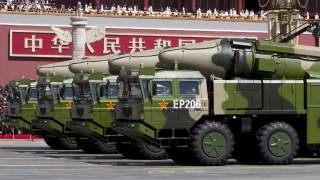No, Trump Probably Isn’t Going to Negotiate a New Nuclear Treaty With China
Beijing would want something in return that Trump likely won’t give up.
On Feb. 2, 2019, the U.S. State Department formally notified the Russian government of its intention to withdraw from the 1987 Intermediate-Range Nuclear Forces Treaty, which banned ground-launched nuclear-capable weapons with ranges between 310 and 3,400 miles.
The Trump administration accused Russia of violating the INF Treaty by introducing a new nuclear-armed cruise missile whose range fell within the treaty's restrictions. Moscow denied the accusation.
American critics of the treaty also claimed that the INF Treaty hamstrung the United States when it came to developing middle-range weapons to compete with China's own missile arsenal.
The United States could negotiate a new treaty to replace the INF Treaty, Pres. Donald Trump said in his Feb. 5., 2019 state-of-the-union address. And that treaty could include China, Trump claimed.
That's unlikely to happen, explained Gregory Kulacki, a nuclear expert with the Massachusetts-based Union of Concerned Scientists.
The United States probably would have to agree to broad limitations on its own weaponry in order to bring China to the table. But the Trump administration consistently has wanted fewer, not more, restrictions on its weapons.
"Decades ago the United States entered into a treaty with Russia in which we agreed to limit and reduce our missile capabilities," Trump said in his speech. "While we followed the agreement to the letter, Russia repeatedly violated its terms. That is why I announced that the United States is officially withdrawing ... "
"Perhaps we can negotiate a different agreement, adding China and others," Trump added, "or perhaps we can't --- in which case, we will outspend and out-innovate all others by far."
The problem for China isn't nuclear weapons, rather non-nuclear ones. "China has a small number of nuclear-armed ground-based intermediate range missiles that would fall under the original INF Treaty limits," Kulacki wrote. "But it also has a much larger number of conventionally-armed missiles in this class that seem to be the major concern of U.S. advocates of withdrawing from the treaty."
"Figuring out how to negotiate an expanded INF Treaty that would require China to dismantle them would introduce a number of new and difficult issues to resolve, but it could also lead to some very productive conversations on how to build trust and preserve the peace in East Asia.
Sadly, I suspect U.S. advocates of killing the INF Treaty have no intention to talk to China about joining it, but if the United States wanted to open negotiations China is likely to put forward a few conditions."
For starters, any discussion on intermediate-range missiles probably would have to take place in the United Nations Conference on Disarmament, Kulacki pointed out.
"China must not be the only target of concern," Kulacki wrote. "Most if not all of the other nations that possess this class of weapon would have to be included. Chinese leaders prefer international rather than bilateral or multilateral forums for arms control negotiations. It’s not an unreasonable preference, and it predisposes Chinese negotiators to accept the general principle that restrictions should apply to everyone."
But the UNCD effectively shut down in 1999 after Republicans in the U.S. Senate rejected a nuclear test ban, the first major arms-control initiative to fail in the Senate. Reviving the UNCD "will be difficult," Kulacki wrote, "because decisions are made by consensus—a norm for negotiations many cultures prefer."
"Consensus may require discussion of other arms-control issues. Recent history suggests preserving peace in outer space may be one of them." And Trump, with his odd obsession with a "space force," seems unlikely to agree to new limits on orbital weaponry.
U.S. negotiators also would have to accomodate China's own strategic concerns, bucking the "America-first" instinct that has prompted Trump to withdraw the United States from a range of international agreements.
"International arms-control negotiations are not an apples-for-apples, oranges-for-oranges kind of thing," Kulacki explained. "They’re an apples-for-my-pick-from-the entire-produce-aisle sort of thing. Different countries choose to rely on different weapons for all kinds of reasons, like geography."
"Because of its huge land mass and its concerns about the assemblage of conventional U.S. forces on its periphery, China sees conventionally armed ground-based intermediate range missiles as an especially effective countermeasure. It’s invested decades of effort and substantial financial and technical resources in developing and deploying those missiles.
Asking China to give them up is going to cost the United States something in return.
If the United States were serious about wanting China to join the INF Treaty, it would be talking with Chinese arms-controllers about changes the United States might be willing to make in exchange for surrendering what Chinese military planners see as one of their most valuable military capabilities.
There is no indication such a discussion has ever taken place."
David Axe serves as Defense Editor of the National Interest. He is the author of the graphic novels War Fix, War Is Boring and Machete Squad.
Image: Reuters.


